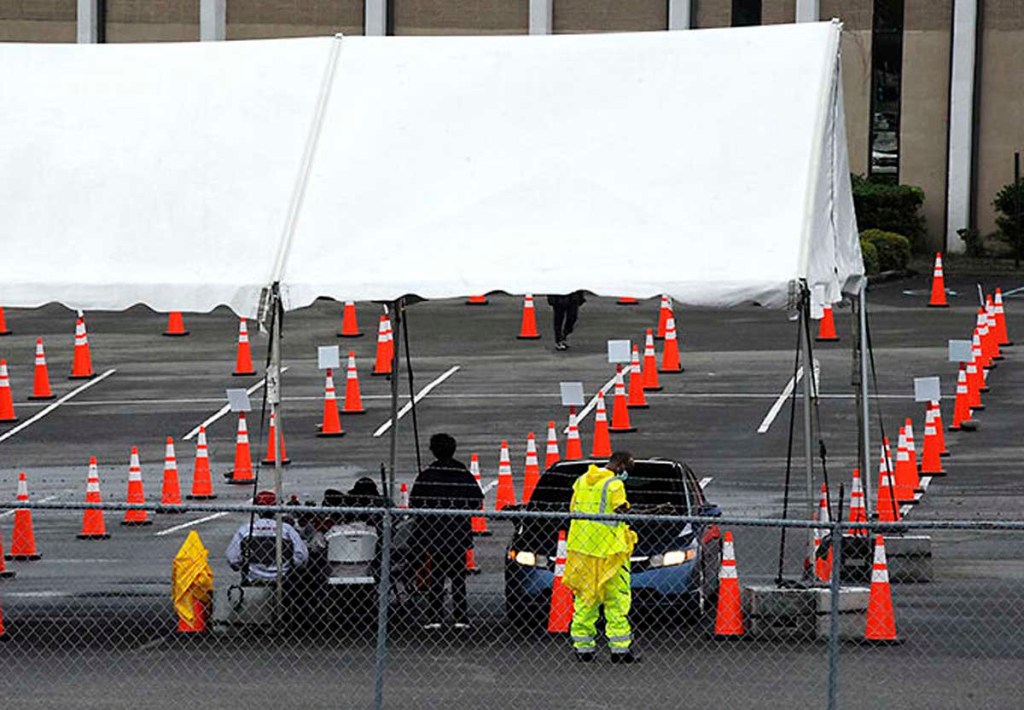Gov. Ivey says pandemic is ‘managed,’ orders to end
Published 4:00 pm Monday, May 3, 2021

- Workers at a mostly empty COVID-19 vaccination clinic located at Cathedral of the Cross A.O.H. Church of God in Birmingham, Ala., are shown on Monday, May 3, 2021. Health officials say vaccine demand is on the decline in some places, and Alabama Gov. Kay Ivey said she will soon end a state health order and state of emergency enacted because of the coronavirus pandemic.
BIRMINGHAM, Ala. — Declaring the COVID-19 pandemic “absolutely” managed despite lagging vaccinations, Alabama Gov. Kay Ivey said Monday she will end a state health order meant to guard against the spread of an illness that has killed nearly 11,000 people statewide.
Citing improved infection rates, fewer hospitalizations and more widespread immunizations, Ivey said the current health order recommending that people follow health recommendations and requiring some precautions for senior citizens and long-term care facilities will end on May 31, barring a sharp rise in cases.
A state of emergency declared because of the health threat will end July 6, she said in a statement.
“For over a year now, Alabamians, like people around the globe, have made sacrifices and adjusted to a temporary ‘new normal.’ We have learned much since last year, and this is absolutely now a managed pandemic. Our infection rates and hospitalizations are in better shape, and over 1.5 million Alabamians have had at least one shot of the COVID-19 vaccine,” Ivey said.
Deaths have declined sharply across the United States in recent weeks, and Alabama has followed the trend. Hospitalizations across the state are roughly 10% of what they were in mid-January when the situation was at its most dire.
While the state’s infection rate has inched up to 5.5% in the last two weeks, that’s far better than the rate of 22.1% in early January.
Cullman Regional Chief Medical Officer Dr. William Smith said the number of COVID-19 hospitalizations due to the virus have been on the decline locally. “In February we started seeing a steady decline in COVID patients in the hospital and by March the 2nd we had five COVID patients in house with one on the ventilator in CCU. Since March 2 our COVID patient numbers have steadily fluctuated between 2 and 11 per day with one on the ventilator,” he said.
The hospital has also had fewer patients referred for monoclonal antibodies – a treatment that has proven effective at preventing serious illness from the virus. Smith said they seeing two to three cases a day, compared to 25 cases per day previously.
Alabama ranks No. 49 nationally in its vaccination rate, better only than neighboring Mississippi, and health officials say demand is declining in places. With vaccination rates lagging particularly in areas dominated by conservative white people, health officials have said it is unclear how many more people might be willing to get a shot.
Dr. Ellen Eaton, an infectious disease specialist at the University of Alabama at Birmingham, said physicians are seeing more and more COVID-19 who are young and not vaccinated. With only 22% of the state’s residents fully vaccinated, leaders should aim for more widespread protection before any return to business as usual, she said.
“If we can’t reach this goal, we will continue to see clusters and outbreaks in unvaccinated workers, we will continue to see essential workers and students out sick/in quarantine, and we will continue to see kids missing out on learning in the classroom. And these are all avoidable through widespread vaccination,” Eaton said in an email.
Ivey, a Republican, called the immunization “safe and effective” and urged people to get it.
“Look, I have been vaccinated. I believe in the science, believe that it works and have confidence in it. So, like I said, I have been fully vaccinated, and I will live like I have been fully vaccinated,” she said.
Alabama’s death count of 10,913 is the 16th highest in the country overall and the ninth highest per capita, according to researchers at Johns Hopkins University. Over the past two weeks, the rolling average number of daily new cases has decreased by 148, a decrease of 29.6%.



